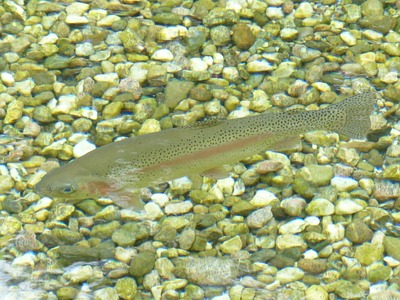Parasite Discovered in Wild Trout in Wisconsin
Saturday, April 6th, 2024 -- 8:01 AM

(Danielle Kaeding, Wisconsin Public Radio) For the first time, the Wisconsin Department of Natural Resources has discovered a parasite in wild trout that’s known to cause disease, raising questions about its potential effects on fish populations.
According to Danielle Kaeding with Wisconsin Public Radio, the DNR said Wednesday that tests showed the microscopic parasite Myxobolus cerebralis turned up in brook trout within Elton Creek, a Class 1 trout stream in Langlade County.
The parasite affects fish like trout and salmon. It requires two hosts as part of its life cycle, fish and a small bottom-dwelling worm in streams and ponds. The parasite can infect young fish, attacking their cartilage and nerve tissue. It can also lead to whirling disease.
Symptoms of the disease include fish swimming in circles, fish deformities and a black tail. David Giehtbrock, fish culture section leader with the DNR, said discovery of the parasite in wild trout is a serious issue.
“It has had significant effects in the western states on trout populations,” Giehtbrock said. “We note that we didn’t find any clinical signs of disease in the Elton Creek fish that we examined.”
Fish infected with the parasite don’t pose a risk to human health, but anglers are urged not to eat fish showing signs of sickness or disease. Giehtbrock said it’s unclear what effect the parasite may have on fish populations, but rainbow and brook trout are most susceptible to the disease. The state routinely tests for the parasite as part of inspections at about 2,500 registered fish farms.
The DNR tested wild fish for the parasite after the Wisconsin Department of Agriculture Trade and Consumer Protection, or DATCP, notified the agency that it had been found within rainbow trout during a routine inspection at a private fish farm.
Feel free to contact us with questions and/or comments.




